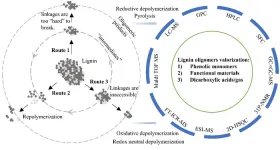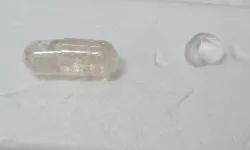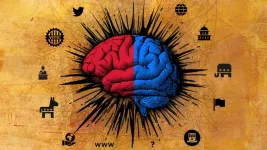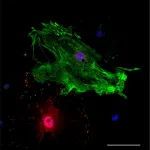(Press-News.org) Due to the recent improvements in the efficiency with which solar cells made from organic (carbon-based) semiconductors can convert sunlight into electricity, improving the long-term stability of these photovoltaic devices is becoming an increasingly important topic. Real-world applications of the technology demand that the efficiency of the photovoltaic device be maintained for many years. To address this key problem, researchers have studied the degradation mechanisms for the two components used in the light-absorbing layer of organic solar cells: the ‘electron donor’ and ‘electron acceptor’ materials. These two components are needed to split the bound electron-hole pair formed after the absorption of a photon into the free electrons and holes that constitute electrical current.
In this new study reported in Joule, an international team of researchers led by the Cavendish Laboratory, University of Cambridge, have for the first time considered the degradation pathways of both the electron donor and electron acceptor materials. The detailed investigation of the electron donor material sets the current research work apart from the previous studies and provides important new insights for the field. Specifically, the identification of an ultrafast deactivation process unique to the electron donor material has not been observed before and provides a new angle to consider material degradation in organic solar cells.
To understand how these materials degraded, the Cavendish researchers worked as part of an international team with scientists in the UK, Belgium, and Italy. Together, they combined photovoltaic device stability studies, where the operational solar cell is subject to intense light that closely matches sunlight, with ultrafast laser spectroscopy performed in Cambridge. Through this laser technique, they have been able to identify a new degradation mechanism in the electron donor material involving twisting in the polymer chain. As a result, when the twisted polymer absorbs a photon, it undergoes an extremely rapid deactivation pathway on femtosecond timescales (a millionth billionth of a second). This undesirable process is fast enough to outcompete the generation of free electrons and holes from a photon, which the scientists were able to correlate with the reduced efficiency of the organic solar cell after it had been exposed to simulated sunlight.
“It was interesting to find that something as seemingly minor as the twisting of a polymer chain could have such a large effect on the solar cell efficiency,” said Dr. Alex Gillett, the lead author of the paper. “In the future, we plan to build on our findings by collaborating with chemistry groups to design new electron donor materials with more rigid polymer backbones. We hope that this will reduce the propensity of the polymer to twist and thus improve the stability of the organic solar cell device.”
Due to their unique properties, organic solar cells can be used in a wide range of applications for which traditional silicon photovoltaics aren’t suitable. This could include electricity generating windows for greenhouses that transmit the colours of light required for photosynthesis, or even photovoltaics that could be rolled up for easy transportation and mobile electricity generation. Thus, by identifying the degradation mechanism that needs to be solved, the current research directly brings the next generation of photovoltaic materials and applications closer to reality.
https://doi.org/10.1016/j.joule.2023.03.002
END
New findings pave the way for stable organic solar cells that may enable cheap and renewable electricity generation
2023-04-19
ELSE PRESS RELEASES FROM THIS DATE:
Perspective on oligomeric products from lignin depolymerization: their generation, identification, and further valorization
2023-04-19
Lignin depolymerization is playing a pivotal role in transforming the second most abundant biopolymers in nature into many valuable chemicals/fuels. This route could directly replace their petrol-based equivalents and therefore a great pathway to fight climate change and contribute to future sustainability. Interpretation of the reaction pathways is always desired to gain an insightful mechanic view in understanding the depolymerization chemistry and also paving new paths for lignin valorization at the industrial scale. However, such interpretation heavily relies on the state-of-art analytical capability since ...
UVA launches ambitious effort to reduce health disparities
2023-04-19
The University of Virginia School of Medicine has launched a new Center for Health Equity and Precision Public Health to improve the health and well-being of rural residents, the economically challenged and minority groups across Virginia and beyond.
The center will bring to bear expertise from across UVA to tackle many of today’s greatest public health issues. The goal: reduce health disparities and promote health equity to help people live longer, healthier lives.
“The pandemic has really taught us that, one, our public health infrastructure is not nearly as strong as it should be. And, two, we can't ...
Wonder drug-capsule may one day replace insulin injection for diabetics
2023-04-19
Scientists in Melbourne have designed a new type of oral capsule that could mean pain-free delivery of insulin and other protein drugs.
Co-lead researcher Professor Charlotte Conn, a biophysical chemist from RMIT University, said protein drugs had proven challenging to deliver orally as the drugs degrade very quickly in the stomach – until now.
“These types of drugs are typically administered with an injection – thousands of diabetics in Australia need insulin injections up to several times a day, which can be unpleasant for the patient and results in high healthcare costs,” said Conn, from RMIT’s School of Science.
She said the new technology could also be ...
Scientists reviewed the research and development of Tianzhou cargo spacecraft
2023-04-19
Cargo spacecraft is robotic spacecraft designed to support space station operation by transporting food, propellant and other supplies. Tianzhou cargo spacecraft (The abbreviation is TZ) is a Chinese automated cargo spacecraft developed by the China Academy of Space Technology, as part of China's manned space Station program. The China Academy of Space Technology began to design TZ in 2010. Its main tasks are transporting and storing supplies for the space station, storing and descending waste materials for the space ...
SwRI launches the Global Decarbonized Mobility Summit Nov. 13-17
2023-04-19
SAN ANTONIO – 4.19.23 —Southwest Research Institute (SwRI) will host the inaugural Global Decarbonized Mobility Summit (GDMS) on Nov. 13-17. The multi-day summit will bring together key stakeholders in the transportation industry to discuss technology challenges associated with sustainable decarbonized mobility solutions for on-and-off-road applications.
The GDMS will assemble industry members from SwRI’s many automotive-related consortia and joint industry projects at its San Antonio headquarters. Throughout the summit, SwRI staff experts will hold sessions on the latest research and development advancements, pathways ...
Nebraska-led study first to define anxiety spiraling from national election
2023-04-19
Researchers are beginning to better understand the toll of polarized politics on mental and physical health, and a new study suggests that Americans’ political anxiety crescendos before a major election.
Led by University of Nebraska–Lincoln political scientist Kevin Smith, with Aaron Weinschenk of the University of Wisconsin–Green Bay and Costas Panagopoulos of Northeastern University, the study is the first to examine anxiety tethered to a specific political event — the 2020 presidential election, touted by both sides as the ...
A second chance for a healthy heart
2023-04-19
A recent study using mice has revealed a way to turn back the clock after heart attack. The researchers behind the work used RNAs to instruct cells in an injured heart to eliminate scar tissue and recreate cardiac muscle, allowing the heart to function like new again.
Cardiovascular disease, including heart attack, is the leading cause of death worldwide.
“Adult human hearts are not very good at repairing themselves,” said Conrad Hodgkinson, an associate professor of medicine and pathology at Duke University School of Medicine who oversaw the study. “Once they have a heart attack or any type of damage, ...
Study explores prosocial behavior within, between religious groups
2023-04-19
Does a commitment to one’s God facilitate altruistic behavior that benefits only members of the same religious group? Or does it extend to helping members of a different religion?
University of Illinois Chicago social psychologist Michael Pasek and colleagues examined this question through field and online experiments involving more than 4,700 people from diverse ethnoreligious populations in three political and cultural contexts.
Christians, Muslims, Hindus and Jews in the Middle East, Fiji and the United ...
Bad medical news causes patients to choose brand name drugs over generics, costing billions
2023-04-19
Researchers from Johns Hopkins University published a new Journal of Marketing article that examines how receiving negative medical results might affect how people choose between generic and brand name drugs.
The study, forthcoming in the Journal of Marketing, is titled “Does Bad Medical News Reduce Preferences for Generic Drugs?” and is authored by Manuel Hermosilla and Andrew T. Ching.
At the height of the COVID-19 pandemic, Manuel Hermosilla received a call from a family friend in Chile who had been recently diagnosed with cancer. The friend needed help tracking down Hydroxychloroquine to treat ...
Healthy ageing and longevity: topic for scientific meeting on Okinawa
2023-04-19
The Japanese island Okinawa is known for its high number of centenarians, healthy diet and lifestyle. Due to this it is one of the few areas in the world that is called “blue zone”. During May 12-13, leading international scientists and inspiring speakers will meet on Okinawa for two full days of talks about the latest research on longevity and healthy ageing – and what we can learn from so called “blue zones”.
“It is a perfect place to interact, update and develop the research ...








